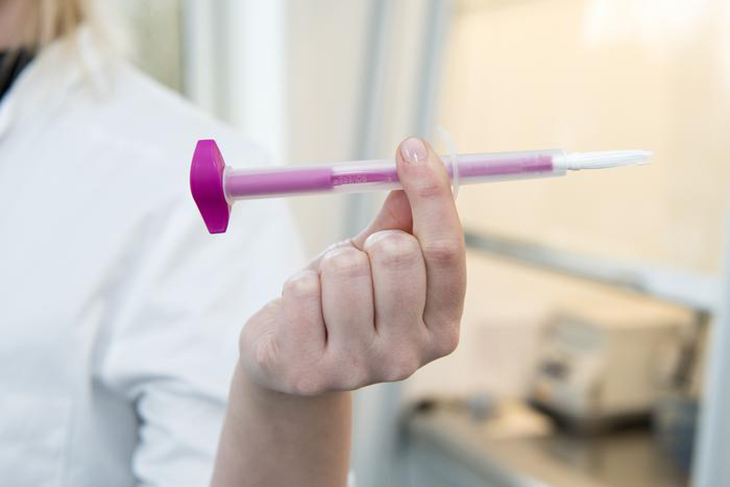
A recent study suggests that women aged 65 to 75, especially those in good health with expectations of a long life, should consider discussing HPV screening with their doctor as a means of preventing cervical cancer. Even if they have never undergone high-risk HPV tests, women in the 65 and older age group can still reduce their risk of cervical cancer through screening.
The study indicates that women who have not previously received “high-risk” human papillomavirus (HPV) tests can potentially benefit from cervical cancer screenings after reaching the age of 65. These high-risk tests have gained popularity in recent years due to their ability to detect HPV, the virus responsible for cervical cancer, at its earliest stages, surpassing the capabilities of traditional Pap smears, which have long served as the standard screening method. It’s worth noting that high-risk HPV tests are relatively new, leading to the majority of women over 65 never having undergone this screening, as highlighted in the study published on July 6 in the journal PLoS Medicine.
Catching Precancerous Cells May Stave Off Cervical Cancer
In the recent study, scientists aimed to assess the potential benefits of high-risk HPV tests for women aged 65 and above, a demographic currently not recommended for regular cervical cancer screenings. The researchers extended invitations to over 11,000 Danish women between the ages of 65 and 69. These women were given the option to undergo high-risk HPV tests administered by doctors in a clinical setting, involving the use of a speculum to collect cervix tissue samples, or to opt for less invasive at-home HPV tests. Additionally, the study included a control group comprising more than 33,000 similar women who were not invited to participate in the screening process.
“Providing women aged 65 to 69 without previous record of HPV-based cervical cancer screening — a catch-up HPV cervical cancer screening offer — has the potential to improve cervical cancer prevention at older ages,” said the lead study author, Mette Tranberg, PhD. She is a cancer epidemiologist at Randers Regional Hospital in Denmark.
In the study, approximately 62% of the Danish women who were invited for HPV tests underwent screening within a year, while only about 2% in the control group participated. Among the screened group, 3.9 cases of precancerous cervical tissue were detected per 1,000 women, in contrast to the control group where only 0.3 cases were identified for every 1,000 women.
Years for HPV to Turn Into Cervical Cancer
Dr. Tranberg indicates that the absence of screening in certain women during the study implies that there might have been undetected cases of precancerous abnormal cervical tissue. Since some types of HPV abnormalities can take years to progress into full-fledged cervical cancer, it is uncertain whether detecting precancerous abnormal cervical tissue would ultimately lead to saving lives.
“It is true that not all detected cervical precancer lesions would have progressed into cancer in the woman’s remaining life span,” Tranberg said. “Therefore, the detection and treatment of these precancer lesions could be considered as overtreatment.”
In the United States, women between the ages of 21 and 65 are advised to undergo cervical cancer screening every three to five years. The HPV vaccine has proven effective in preventing cases among younger women and is anticipated to reduce the incidence of cervical cancer and related deaths over time.
As part of routine adolescent preventive care, the HPV vaccine is recommended for individuals of all genders. It is also advised for adults up to 26 years old who missed the vaccine during their youth and for specific adults up to 45 years old, based on their doctors’ recommendations, as per the guidelines provided by the U.S. Centers for Disease Control and Prevention (CDC).
The CDC reports a decline in the number of women infected with the HPV strains most responsible for cervical cancer, attributing this positive trend to the increasing regularity of vaccinations.
Healthy Older Women Can Benefit from HPV Screening Even Until 75 Years of Age
Many older women have missed out on the opportunity to receive the HPV vaccine, which is most effective when administered before becoming sexually active and being exposed to HPV during sexual activities.
A study published on January 9, 2023, in the journal Cancer Epidemiology, Biomarkers & Prevention revealed that almost 20% of new cervical cancer cases diagnosed between 2009 and 2018 occurred in women aged 65 and older. These older women were more likely to be diagnosed with advanced-stage cancer compared to those under 65, leading to lower five-year survival rates.
Even so, discontinuing HPV screening at age 65 is reasonable for women who have consistently undergone recommended screenings and have had normal results for the past ten years, according to Lindsay Locklar, a certified nurse midwife at Aurora Health Care in Oshkosh, Wisconsin.
For individuals with a history of moderate to severe cervical lesions or those who haven’t completed recommended screenings, continuing screening until age 75 might be advisable, especially if they are relatively healthy in their sixties. This increases the potential for treating any cervical lesions found during screening, potentially leading to longer life expectancy.
“If they’ve had normal and adequate screening, they can discontinue at 65 according to current U.S. guidelines,” Locklar added. “That said, for patients without serious health issues anticipating a long life expectancy, I feel it is reasonable to continue screening until 75.”



